At Mentor Collective, we believe the secret to effective networking is paying it forward. Connecting others keeps your network active and, most importantly, helps others connect with the people, ideas, and opportunities that help them succeed.
Our work gives us the opportunity to interact with the academics, leaders, and administrators who work tirelessly to understand and improve student outcomes through mentorship. They go by many identities but have one thing in common – the desire to make an impact by challenging the way we think about higher education and the student experience.
We call them Mentorship Champions.
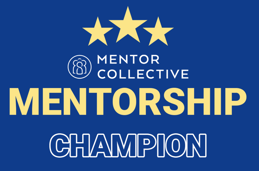
This month we’re pleased to announce our Mentorship Champion as Dr. Charmaine Troy.
As the Georgia Institute of Technology’s first-ever, first-generation and limited income program and operations manager, Dr. Troy leads the university’s work in supporting the co-curricular success of first-generation college students. She has held prominent student success roles at Virginia Tech and has served as an advisory board member for Gwinnett County Public Schools Community-Based Mentoring Program; as Vice Chairman of the Wake County Housing Authority Commission in North Carolina; and as a Director of the Wake County Housing Finance Corporation. She currently serves on the Board of Directors for the Montgomery County (VA) Economic Development Authority.
We’ve been honored to collaborate with Dr. Troy on the Georgia Tech First-Gen Jackets Peer Mentorship Program and co-present that program’s success at the 2022 NASPA Student Success Conference (standing-room only!). You can hear more about that program and Dr. Troy’s soon-to-be-released research on the first-generation college experience at our upcoming webinar on August 31st.
(Learn more about Dr. Charmaine Troy)
Mentor Collective’s Head of Partner Marketing Alexandria Glaize chatted with Dr. Troy about being our Mentorship Champion. Read on to see how mentorship has impacted Dr. Troy's professional trajectory and why paying it forward is so important for her.
Alexandria Glaize (AG): What does mentorship mean to you?
Charmaine Troy (CT): Mentorship means access. When we talk about our strategic plan [at Georgia Tech], we're talking about expanding access. Having this mentorship program in place provides access for our first-generation students. Our mentors are preparing them for that transition into Georgia Tech and providing them with access to the resources and knowledge they would otherwise not know; or they would have to do trial-and-error to learn.
She showed me that I could provide mentorship to other people and give to other people what she taught me. If I didn’t have that mentorship, I would be a totally different person. I was focused on so many wrong things at that time, and that mentor in my life shifted my whole perspective and direction in life.
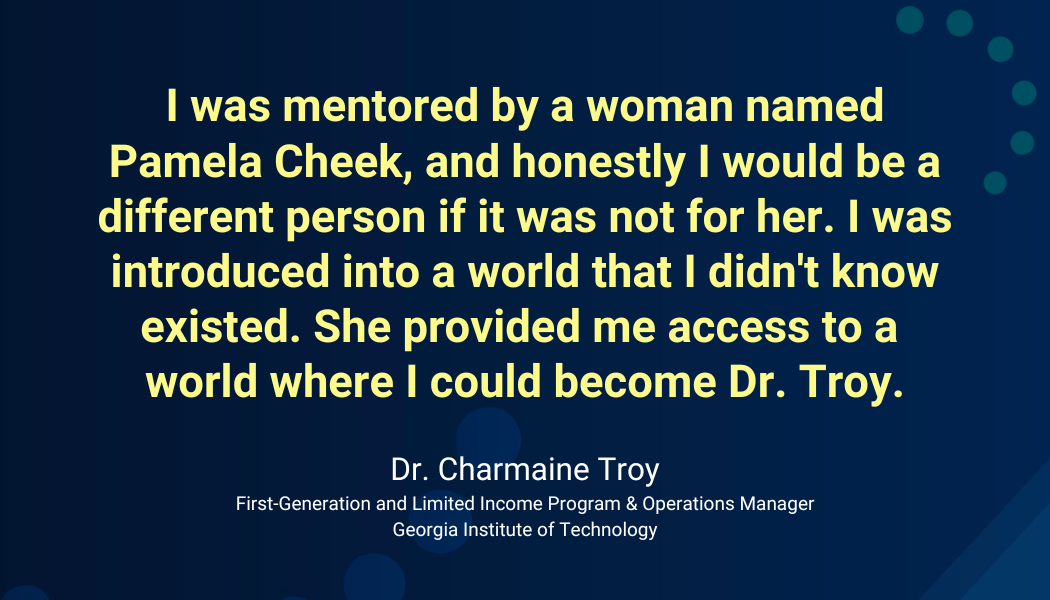
AG: That’s so powerful!
CT: She was amazing. I was so enamored with her, what she taught me, and how she completely changed my perspective of who I was that I started bringing my friends to her.
AG: I love that you said, "she introduced me to a world that I didn't know existed." That's really important, because it just reminds me of the importance of representation.
CT: When I met her for the first time, I was in baggy jeans and a baggy t-shirt. I didn’t dress up often. She said to me: "Look, in order to be in the room and really be present, there are some things you need to change." I started buying suits and skirts to add to my wardrobe.
She started taking me networking and to events just so I could learn how to talk to people. She taught me dinner etiquette and how to network. She started taking me around various campus events and introducing me to other Black faculty members on campus. She introduced me to the concept of networking, something I didn’t know.
AG: I love that so much. It reminds me of the importance of the work that you do and that we do at Mentor Collective and the small ways we can make an impact.
What advice would you give to someone seeking a mentor, or someone who may want to make the most of their current mentoring relationship?
CT: The advice I would give to someone seeking a mentor would be to find someone that represents where you want to be. A mentor is there to encourage you to the next phase of life, get you closer to how you envision yourself to be, or what you want to be. You need someone that is helping you come to the table and pulling out your seat, if you will. For me, I don’t want someone to mentor me that is already where I am. Sorry, I don’t. I want to learn from someone that has more expertise than me. I want to learn their knowledge. I want to learn from their experiences.
AG: And what advice would you give to someone who wants to make the most out of their current mentoring relationship?
CT: To make the most of a mentorship, you have to be humble. You need to allow the change to occur and look past the idea of what you currently have and embrace what someone else is telling you. They didn’t get to where they are without change, so you have to be able to embrace their feedback and advice.
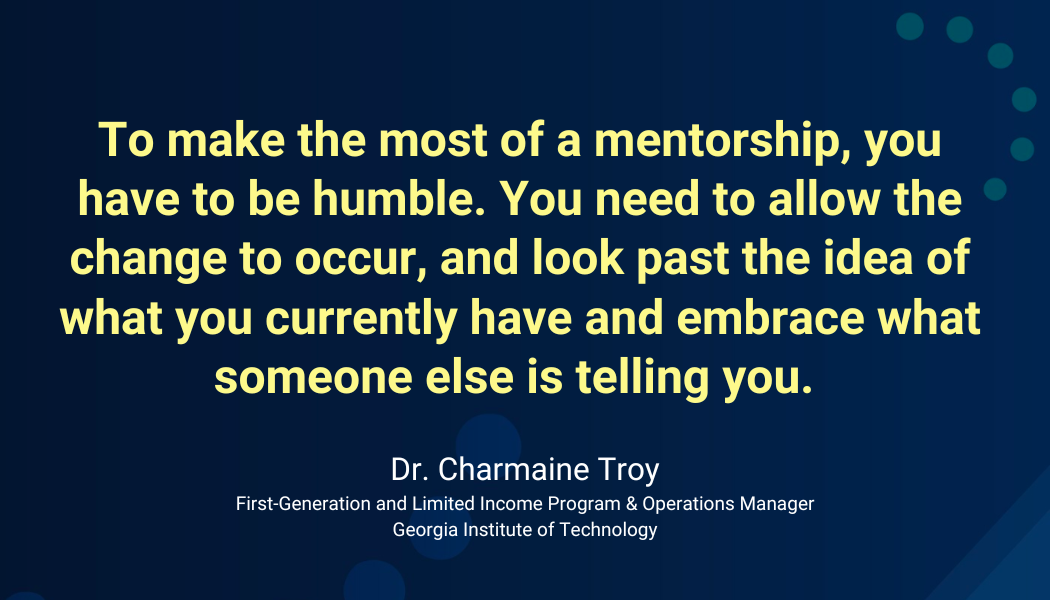
AG: Great advice! You told us about your first major mentor earlier, Pamela Cheat, but has mentorship shown up in other areas of your life?
.png?width=411&name=Dr_%20Troy%20and%20Dr_%20Jackson%20(GGC).png) CT: I’ve had mentors throughout my life and I'm always open to having mentors, because there’s never a point where you don’t need mentorship. There's always someone to learn from and even build with. I have mentors with whom I collaborate. Karen Jackson [at Georgia Gwinnett College], for example (pictured with Dr. Troy). We’re co-authors on an upcoming book. She was my boss two institutions ago. She and I then became good friends and she became a mentor to me. Again, she’s in a position higher than myself. She already had her PhD at the time, but I didn’t have mine. She provided me with advice and encouragement at a time when I wanted to give up. I was raising a child alone and trying to do this PhD work, and trying to work full-time. I was tired. I will never forget she bought me a mug that said ‘You can do this,’ for Christmas. I kept that mug out and would get up in the middle of the night and write just so I could get through my dissertation. I was ready to let it go, but she kept encouraging me. It was a transition - from supervisor/subordinate to collaborator - all because of mentorship.
CT: I’ve had mentors throughout my life and I'm always open to having mentors, because there’s never a point where you don’t need mentorship. There's always someone to learn from and even build with. I have mentors with whom I collaborate. Karen Jackson [at Georgia Gwinnett College], for example (pictured with Dr. Troy). We’re co-authors on an upcoming book. She was my boss two institutions ago. She and I then became good friends and she became a mentor to me. Again, she’s in a position higher than myself. She already had her PhD at the time, but I didn’t have mine. She provided me with advice and encouragement at a time when I wanted to give up. I was raising a child alone and trying to do this PhD work, and trying to work full-time. I was tired. I will never forget she bought me a mug that said ‘You can do this,’ for Christmas. I kept that mug out and would get up in the middle of the night and write just so I could get through my dissertation. I was ready to let it go, but she kept encouraging me. It was a transition - from supervisor/subordinate to collaborator - all because of mentorship.
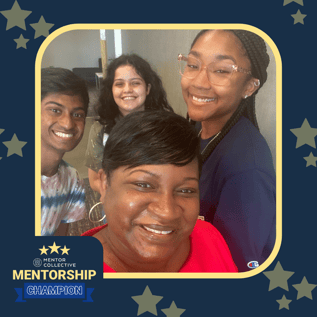 AG: The simple things are often the greatest nudges and motivators. I think I can guess this answer from all that you’ve shared, but what makes you want to champion mentorship?
AG: The simple things are often the greatest nudges and motivators. I think I can guess this answer from all that you’ve shared, but what makes you want to champion mentorship?
CT: Because someone championed mentorship through me.
Without my mentors, I would not be where I am. I promise you. I want to give that to other people…especially students. There are so many of us that want to give up, because we hit roadblocks. If I had given up during my undergraduate years, I wouldn’t be where I am today. I was already at a roadblock when I met my first mentor - my life would be different if I didn’t met and listen to her. That’s why I do it.
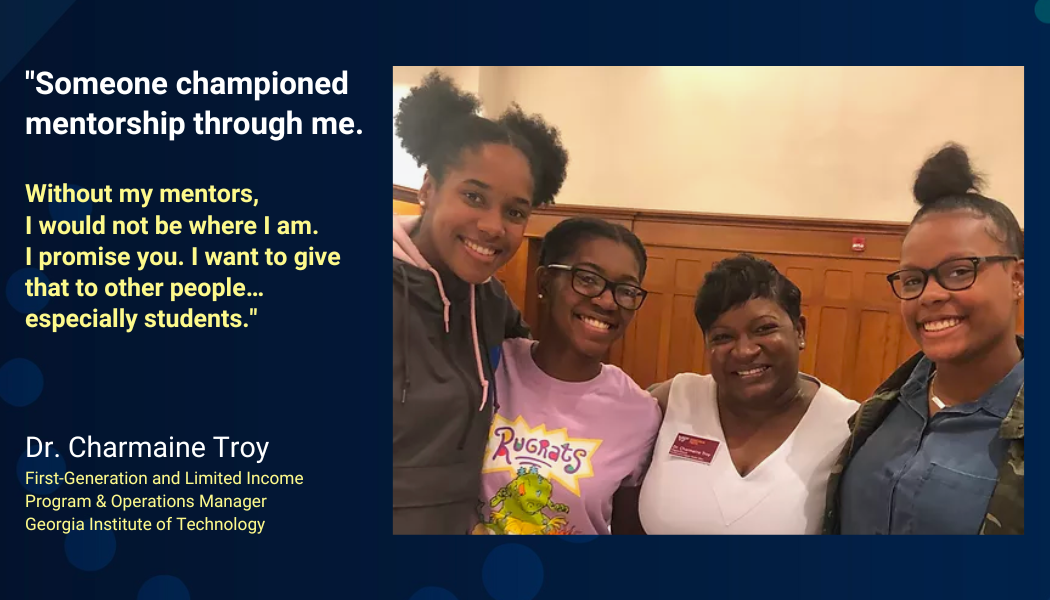
AG: It’s so true. It's simple, but it’s powerful. I think a lot of people can see themselves in you, and I think that’s why mentorship matters.
---
Reach out to Alexandria Glaize at alexandria@mentorcollective.org to submit your nomination and help us uplift the work of extraordinary individuals.